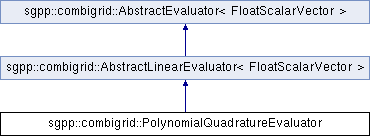 |
SG++-Doxygen-Documentation
|
 |
SG++-Doxygen-Documentation
|
This evaluator does quadrature based on the given grid points. More...
#include <PolynomialQuadratureEvaluator.hpp>

Public Member Functions | |
| std::shared_ptr< AbstractLinearEvaluator< FloatScalarVector > > | cloneLinear () override |
| Clones this object and returns it as a shared pointer to AbstractLinearEvaluator<V>. More... | |
| double | getAbsoluteWeightSum () const |
| std::vector< double > | getBasisCoefficients () override |
| std::vector< FloatScalarVector > | getBasisValues () override |
| This method is specific to AbstractLinearEvaluator and has to be implemented by all subclasses. More... | |
| double | getRelativeConditionNumber () const |
| bool | needsOrderedPoints () override |
| bool | needsParameter () override |
| PolynomialQuadratureEvaluator () | |
| PolynomialQuadratureEvaluator (sgpp::combigrid::SingleFunction weight_function, bool normalizeWeights=true, size_t numAdditionalPoints=10) | |
| PolynomialQuadratureEvaluator (PolynomialQuadratureEvaluator const &other) | |
| void | setBasisCoefficientsAtGridPoints (std::vector< double > &functionValues) override |
| set the basis coefficients for the linear combination. More... | |
| void | setGridPoints (std::vector< double > const &newXValues) override |
| Sets the grid points for evaluation. More... | |
| void | setParameter (FloatScalarVector const ¶m) override |
| Via this method, the parameter can be set. More... | |
| virtual | ~PolynomialQuadratureEvaluator () |
 Public Member Functions inherited from sgpp::combigrid::AbstractLinearEvaluator< FloatScalarVector > Public Member Functions inherited from sgpp::combigrid::AbstractLinearEvaluator< FloatScalarVector > | |
| virtual std::shared_ptr< AbstractEvaluator< FloatScalarVector > > | clone () |
| Clones the AbstractEvaluator object. More... | |
| virtual FloatScalarVector | eval () |
| AbstractLinearEvaluator provides a standard implementation of this method based on getBasisCoefficients(). More... | |
| virtual void | getBounds (double &a, double &b) |
| virtual void | getWeightFunction (sgpp::combigrid::SingleFunction &weight_function) |
| virtual bool | hasCustomWeightFunction () |
| virtual void | setBounds (double a, double b) |
| virtual void | setWeightFunction (sgpp::combigrid::SingleFunction weight_function) |
| virtual | ~AbstractLinearEvaluator () |
 Public Member Functions inherited from sgpp::combigrid::AbstractEvaluator< FloatScalarVector > Public Member Functions inherited from sgpp::combigrid::AbstractEvaluator< FloatScalarVector > | |
| virtual EvaluatorConfiguration | getConfig () |
| (Currently not used). More... | |
| virtual void | setConfig (EvaluatorConfiguration newEvalConfig) |
| void | setLevel (size_t level) |
| This is used to set the level in case an evaluator needs it. More... | |
| virtual | ~AbstractEvaluator () |
Additional Inherited Members | |
 Protected Attributes inherited from sgpp::combigrid::AbstractEvaluator< FloatScalarVector > Protected Attributes inherited from sgpp::combigrid::AbstractEvaluator< FloatScalarVector > | |
| EvaluatorConfiguration | evalConfig |
| size_t | level |
This evaluator does quadrature based on the given grid points.
The quadrature weights are obtained by (numerically) integrating the Lagrange polynomials on the given grid points. In the constructor, a weight function may be passed whose values at the grid points are multiplied with the given function values.
| sgpp::combigrid::PolynomialQuadratureEvaluator::PolynomialQuadratureEvaluator | ( | ) |
| sgpp::combigrid::PolynomialQuadratureEvaluator::PolynomialQuadratureEvaluator | ( | sgpp::combigrid::SingleFunction | weight_function, |
| bool | normalizeWeights = true, |
||
| size_t | numAdditionalPoints = 10 |
||
| ) |
| numAdditionalPoints | Specifies how many Gauss-Legrendre points should be used in addition to the default when integrating the Lagrange polynomials for computing the quadrature weights. This number should be higher if the weight function is hard to integrate. |
| weight_function | optional weight function w that can be included in the quadrature weights. The Quadrature evaluator then approximates the integral of f*w instead of the integral of f. This provides more precision by calling w more often than f, which might be useful if w can be evaluated much faster than f. |
| normalizeWeights | If this is set to true, the weights are normalized so that they sum up to 1. This might be useful if the weight function is (or should be) a probability distribution on the domain. |
References sgpp::combigrid::AbstractEvaluator< FloatScalarVector >::evalConfig, sgpp::combigrid::Scalar_PolynomialQuadrature, and sgpp::combigrid::EvaluatorConfiguration::type.
| sgpp::combigrid::PolynomialQuadratureEvaluator::PolynomialQuadratureEvaluator | ( | PolynomialQuadratureEvaluator const & | other | ) |
|
virtual |
|
overridevirtual |
Clones this object and returns it as a shared pointer to AbstractLinearEvaluator<V>.
Implements sgpp::combigrid::AbstractLinearEvaluator< FloatScalarVector >.
References PolynomialQuadratureEvaluator().
| double sgpp::combigrid::PolynomialQuadratureEvaluator::getAbsoluteWeightSum | ( | ) | const |
References python.statsfileInfo::i.
|
inlineoverridevirtual |
|
inlineoverridevirtual |
This method is specific to AbstractLinearEvaluator and has to be implemented by all subclasses.
It should return the coefficients used for the linear combination of function values. Example: If you want to do a linear interpolation and have the grid points 0.0 and 0.5 and an evaluation point (the parameter) of 0.2, you would return the weights (0.6, 0.4), because the interpolated value is 0.6 * f(0) + 0.4 * f(0.5).
In the case of multi-evaluation, this returns several coefficients for each grid point. Continuing the example above, if you would have evaluation points 0.2 and 0.4, the basis coefficients returned should be ((0.6, 0.2), (0.4, 0.8)).
Implements sgpp::combigrid::AbstractLinearEvaluator< FloatScalarVector >.
| double sgpp::combigrid::PolynomialQuadratureEvaluator::getRelativeConditionNumber | ( | ) | const |
References python.statsfileInfo::i.
|
overridevirtual |
Implements sgpp::combigrid::AbstractLinearEvaluator< FloatScalarVector >.
|
overridevirtual |
Implements sgpp::combigrid::AbstractLinearEvaluator< FloatScalarVector >.
|
overridevirtual |
set the basis coefficients for the linear combination.
In case of linear or polynomial interpolation these basis coefficients are function evaluations
| newBasisCoefficients | the new coefficients |
Implements sgpp::combigrid::AbstractLinearEvaluator< FloatScalarVector >.
|
overridevirtual |
Sets the grid points for evaluation.
The evaluation method should allow for arbitrary grid points to achieve maximal modularity.
Implements sgpp::combigrid::AbstractLinearEvaluator< FloatScalarVector >.
References python.statsfileInfo::i.
|
overridevirtual |
Via this method, the parameter can be set.
Implements sgpp::combigrid::AbstractLinearEvaluator< FloatScalarVector >.